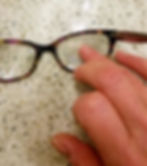Scuba Diving Tricks to Keep Your Cloth Mask From Fogging Your Eye Glasses
- traveleidoscope
- Apr 24, 2020
- 3 min read

Now that we’re all using face masks on the regular, are you having a hard time keeping your glasses from fogging up? Me, too. Trying to figure out how to stop it has been a challenge. Then it occurred to me that, as a scuba diver, I’ve learned tricks to stop my scuba mask from fogging, so maybe they’d work on my eye glasses. Here are my results!
First things first
Make sure you’re wearing your mask properly. Here are the CDC’s guidelines.
Methods I Tested
I tested four methods. One of the methods is, uh, gross. I tried mask defog, soap, toothpaste and.....spit. Yes, spit. I said one of the methods was gross.
The application was the same regardless of method. Apply the treatment to the inside (face side) of your glasses. Rub onto lenses, making sure to cover to the entire lens. After applying and thoroughly rinsing, let your eyeglasses air dry so it doesn’t remove the protective coating you’ve created. Again, these methods are well known to scuba divers (with some minor variations), but my eyeglass tests are purely anecdotal.
How I tested
Some of the methods I tested only in my house (spit). The others I used prior to venturing out. I wore my mask for a few minutes on each test, so the anti fogging methods mentioned may or may not last for longer periods of time.
Spit
Ok, I’m doing this first, since I know you’re all curious. I spit onto the eye side of my lenses and rub, the spit into each lens,making sure to cover the entire lens. After rinsing completely, I let my glasses air dry. I hope you didn’t think I was going to wear spitty glasses...
Results: Kept lenses fog free. I’d make this my last choice though, for obvious reasons.

Defog
I realize anyone who isn’t a scuba diver is unlikely to have this, but for the sake of this experiment, I tried it. Same method as spit – I rubbed the defog onto the entire inside of my lens, rinsed well and air dried.
Results: It’s defog people, it kept my lenses clean, but since only divers will likely have defog, it ranks next lowest on my list.
Dish soap, regular soap or baby shampoo
When diving, we typically use gentle soaps - dish soap like Dawn or Ivory, or baby shampoo, so feel free to use either of those if you’d like. For my eyeglass experiment, I used plain old bar soap and water, like Tone or Neutrogena. I wouldn’t use a deodorant soap, since it may leave a residue. I washed my lenses and like the other two methods, let my glasses air dry.
Results: Worked great and everyone has some kind of gentle soap.
Toothpaste
This is my preferred method to clean my scuba mask. It seems to work best for me. Use regular old paste - not gel toothpaste, not whitening toothpaste. I have no idea why paste toothpaste is recommended (I even checked some scuba diving boards for an explanation). Same process – scrub, rinse, air dry.
Results: Worked awesome! Your lenses sparkle and they’re minty fresh!
*Note: Be careful using toothpaste on plastic lenses - it may scratch them.


What tricks do you use to keep your face mask from fogging your glasses? Tell me about it on Facebook or in Traveleidoscope's comment section!








